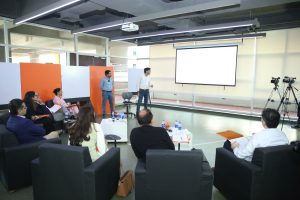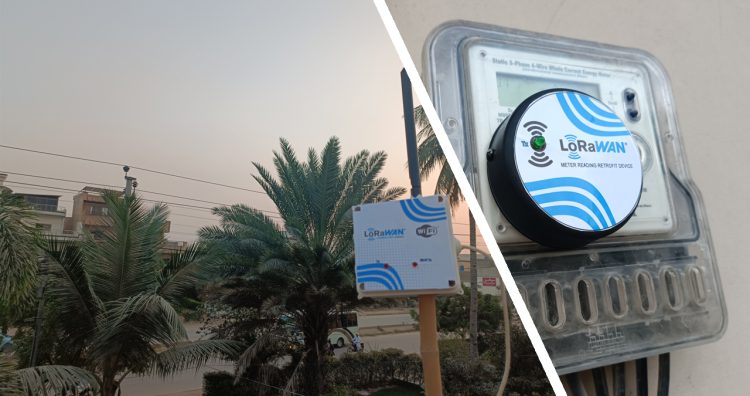It is a matter of great pride to share the news that the NUST-PNEC team has won 2nd runner-up position in the KE 7/11+ Innovation Challenge organized by K-Electric. This podium position was coupled with a Rs 750,000/-investment plus an award from KE and NEPRA. This competition was a 6-month long design challenge for both University-based researchers and Startup entrepreneurs to pitch their solutions to KE’s problems. K-Electric underlined 13 technical problems for this challenge, out of which the team chose the 9th problem, namely ‘Meter Reading Automation’.


KE and other power utility companies in Pakistan using manual meter reading to measure the energy consumption and charging the user. This process has limited real time data which results inaccurate power demand prediction. If there is any fault on user end, the company has to spend resources to manually detect the problems. There is also a lack of energy accounting.
Currently, electricity theft is very common practice. The team proposed their idea initially in April 2022 and underwent two consecutive capacity building stages working with KE to improve their pitch and product. By August this year, they had made it to the top 13 finalists out of 300 initial submissions in total. The team then built the first fully working prototype of their device and demonstrated it live in all future pitches. After more scrutiny by the KE technical team, they finally got the chance to compete with the top 10 finalists in the Grand Finale on 24 Nov 2022 at Habib University. This was the only student team to make it to the top 10. The competition was against post-doctorate researchers and well-established startups and the team won the 2nd Runner-up Position.


The idea that won them this prestigious competition was a LoRaWAN based Meter Reading Retrofit Device. This device can be externally attached onto existing electric power meters and hence converts them into Smart Meters. This retrofit reduces the cost of replacing the meter with a smart meter by 1/3 and also prevents the existing working electrical meters from becoming e-waste.
The device interfaces with the meter using its LED indicators or its optical port. It then sends the entire meter’s data to KE servers continuously, over the LoRaWAN wireless network. This high frequency consumer level data is a key need of DISOCS like KE, as the insights from it can be used to improve the power system in multiple ways. It can then be used to predict the power demand, automatically bill customers, identify faults and theft, and provide detailed insight on the load profile, etc. The students designed and built the first prototype hardware along with its backend software and programming within an extremely short amount of time, resources and using their own funding.
The device enables the smart metering on already installed digital meters, which provide the frequent (every 10 mints) data from meter allow KE and other power utilities to to ensure your customers are being charged the right amount and accurate power prediction of users because of large number of data points, that helps power utilities reducing extra loses, and to produce unerring power required without using inordinate energy resources, which elevate the environmental sustainability. The real time fault and theft detection feature of device reduces the chances of theft and improves the user experience, after implementation of solution power utility don’t have to spend recourses for manual meter reading anymore.


During the competition the team got to know more about the industry demand and made connections with different researchers and startups. A company named Thingsty offered to help the team with their software side and currently a partnership with them is underway. A potential for other power electric companies to buy this device for their networks was also observed.

The team comprised of two students from Electrical Engineering NUST-PNEC, Daniyal Ahmed and Hammad Safeer. They were supervised by Assistant Professor Najeeb Iqbal, he received his BE and MS from NED-UET, Karachi in Electronics Engineering and Assistant Professor Muhammed Mustaqim received his BS from USA and MS from PAF – KIET, Karachi. Daniyal Ahmed has been working on such projects from a very early age and has won countless local as well as multiple international level competitions.
Daniyal Ahmed has vast knowledge of embedded systems and communication networks. Hammad Safeer is the Low Voltage Lead at Formula Electric Racing NUST and has expertise in circuit design and hardware integration. Mr. Najeeb has been teaching at NUST-PNEC for over 20 years. He has vast experience with microcontrollers and embedded systems design. Mr. Mustaqim excels in communication systems and Electromagnetic Theory. The supervisors are leaders in their respective fields which helped push this idea from just an idea to a product able to win this competition.
Team Members
Dr. Najeeb Iqbal is an Assistant Professor in the Department of Electronics & Power Engineering at National University of Sciences & Technology-Pakistan Navy Engineering College (NUST-PNEC). He can be reached at [email protected].
Dr. Muhammed Mustaqim is an Assistant Professor in the Department of (Electronics and Power Engineering at National University of Sciences & Technology-Pakistan Navy Engineering College (NUST-PNEC) and can be reached at [email protected].
Research Profile: https://bit.ly/3W8wGHG
Mr. Daniyal Ahmed is a student of Semester V in the Department of Electronics & Power Engineering at National University of Sciences & Technology-Pakistan Navy Engineering College (NUST-PNEC) and can be reached at [email protected].
Mr. Hammad Safeer is student of semester V in the Department of Electronics & Power Engineering at National University of Sciences & Technology-Pakistan Navy Engineering College (NUST-PNEC) and can be reached at [email protected].
The author is a student at Department of Electronics & Power Engineering at National University of Sciences & Technology-Pakistan Navy Engineering College (NUST-PNEC) and can be reached at [email protected].

![]()





